The Term "Lutheran"
What “Lutheran” Means


Who Was Martin Luther?
Martin Luther was a German catholic priest who was excommunicated by the Pope in the sixteenth century and who became the leading voice of what later came to be known as the Protestant Reformation at that time. He was an outspoken critic of unbiblical practices in the church of his day, practices such as Indulgences, praying to the saints, and relics, which distract believers and draw them away from the merits of Christ and thus from the free grace of God in the Gospel. His desire was never to start a new church!
We Follow Christ, not Luther
We respect and agree with many things that Martin Luther believed, taught, and confessed. We actually really find his writings and commentaries on the Bible helpful, but we certainly do not worship him nor do we adhere to everything he ever said just because he said it. Luther is one of many teachers in a long history of teachers in the church who remained faithful to the Gospel of Jesus Christ in their time.
Sola’s of the Reformation
Keep in mind that when it comes to the Sola’s, there is no one as clear and bold as Luther. Many Protestants will find that there are many points of agreement between Lutherans and Protestants when it comes to these basic Christian truths from the Reformation, but some of this agreement is only on the surface. There are also serious differences between Lutherans and Protestants, not only with regard to the Sacraments, but also with the Sola’s themselves.
An example is Sola Fide.
Why Luther and Not Other Reformers


Other Reformers from the sixteenth century had great respect for Luther, even agreeing with him in many things that Luther himself taught (Calvin and Zwingli being two famous examples), but Luther parted ways with them when they (in his view) rejected the historic and biblical teaching of the church (going back to the apostles and to Christ Himself) on the Sacrament of the Altar (Holy Communion or the Mass), specifically, when they rejected the reality of the physical and spiritual presence of Christ in the Lord’s Supper. This, Luther argued, could not be tolerated in the church, because Jesus’ words must be received simply and in their full power, for they are true:
“Take. Eat. This is My Body.” (Matthew 26:26b; Mark 14:22b)
“This is My Body, which is given for you. Do this in remembrance of Me.” (Luke 22:19b)
The Moderate Reformer
In general Luther’s reforms were moderate in comparison to those of others who wanted a more thoroughgoing reform of the church, even to the point of rejecting the Sacraments as a means of grace in the Gospel. Despite Luther’s tendency to hold on to catholic traditions that do not directly (or by necessary inference) pollute and overturn the hope we have in Christ in the Gospel, the church hierarchy in his day saw Luther as a threat and excommunicated him.
The Marginalized Reformation
The fact that Lutherans today sometimes self-identify as Protestants, rather than as catholics, shows that this strategy by the Roman Catholic papacy was largely (and tragically) successful, for it has isolated the most potent “threat” of Luther’s ideas from the main body of catholics, the world over.
The Augsburg Confession and the Apology of the Augsburg Confession are two great examples of the humble spirit driving Luther, Melancthon, and many others who wanted simply to preserve true catholicism—and never to start a new church—and thus, as servants of the church and princes of the land of Germany, to restore and strengthen the one holy catholic and apostolic church.
Today many people see Luther as the founder of the Protestant Reformation and assume that all Lutherans are just the same as other Protestants (which is incredibly misleading), and it takes much work to demonstrate to them just how catholic Luther actually was even to his dying day.
Rejecting Sacramentarian Theology


We agree with Luther’s negative assessment of the theology and practice of these Sacramentarians, a label applied to all who reject the Sacraments in modern church life. And just like Luther, we resist and struggle today against all false teaching on the Sacraments.
Countering Sacramentarian Theology in Church Today
- We too aim to administer the Sacraments faithfully and purely without falling victim to philosophical influences such as Rationalism, Decisionism, and Pietism.
- It is precisely because Christ points us to Himself through the Sacraments that we can flee from ourselves, from our works, from our internal and subjective feelings, and instead, simply rest in the words and deeds of Christ, holding to the faith that the Holy Spirit gives to us in the Gospel.
- It is precisely because these gifts of the Sacraments are given to us by Jesus (through the ministry of the Holy Spirit) to fill us with His righteousness, that they are outside of our control and beyond our full comprehension.
Revelation over Reason
If you think about it, those external gifts (Gospel Sacraments) are the very mysteries that bring comfort to us poor sinners. Instead of looking inwardly for evidence of salvation to bring hope to ourselves through introspection or spiritual disciplines, we look outside ourselves to the objective reality of Christ’s Word and promise in the Gospel, for, as the Scripture teaches in many places:
Salvation is of the LORD.
Reason cannot answer all questions. And in Christian theology there are mysteries that reason alone cannot explain. We take comfort in the face of such mysteries, as we encounter them in the Sacraments, from the words of Jesus about how we must receive the kingdom—as little babies.
Let the little children come to Me, and do not forbid them; for of such is the kingdom of God. Assuredly, I say to you, whoever does not receive the kingdom of God as a little child will by no means enter it. (Luke 18:16b-17 NKJV)
A Warning about Some Lutheran Churches
Not all Lutherans are the same. Because people often assume that our churches are like the ELCA, it is essential that we distinguish our beliefs and practices from them. We are not in fellowship with the ELCA (Evangelical Lutheran Church of America) nor with her sister congregations around the world, nor do we endorse their doctrines. So we are not “Lutheran” in the same way as they are “Lutheran.”
What “Lutheran” Does Not Mean
Today, the term Lutheran means a lot of different things to different people, but it is reasonable to suppose that Martin himself would have never tolerated any church body being named after him.
- We are not followers of Martin Luther in an absolute sense, but rather, we follow Jesus Christ. When we follow Luther in his teaching, it is because we believe that his teaching aligns with the teaching of Christ.
- We do not reject the Scriptures, but rather, we submit to all of them as the Word of God, and thus as the final authoritative Word that settles all matters of doctrine and practice in the Christian church and life.
- We do not reject the Sacraments, but rather, we receive them from Christ as the gifts He gives to us in the Gospel to connect poor sinners to Himself and thus to make such sinners one with Him by the Word of forgiveness which He imparts through these gifts of the Gospel.
- We do reject 4 out of the 7 Sacraments, at least as they are taught by Roman Catholicism. In our view Jesus only attaches the promise of the Gospel (the free forgiveness of sins and new life in Christ) to three of them, namely:
- Holy Baptism (birth from above and baptism into Jesus’ death)
- the Lord’s Supper (the Mass or Divine Service)
- Confession and Absolution (the Power of the Keys)
- We are not Roman Catholic, but we are members of the one holy catholic and apostolic church, which Jesus created, and we are sons of Abraham by faith in Jesus.
- We are not Protestants, if by that term, one means either:
- that we agree with modern evangelicals when they reject the Sacraments or when they embrace decisionism, individualism, and pietism, or
- that we want to be separated from the historic church in terms of her faith or that we reject all her historic forms of worship in favor of modern trends, even when those historic forms do not contradict the Gospel, or
- that we must be against everything that Roman Catholics believe and practice.
- We are not Open Communion (like some other churches), but we do fellowship with other Christians who are in doctrinal agreement with our confession.
- We are not Antinomian, but rather we teach the Law of God as Jesus and the apostles taught it, particularly the Ten Commandments, which remain in force even after the curse of the Law was lifted by the death of Christ. In doing so, we uphold the free Gospel of Jesus Christ, the forgiveness of sins through the precious blood of Christ which He shed on the Cross for the sins of the world.
- We are not High Church just to be High Church, but rather we hold to the ancient forms of worship transmitted down through the ages, so long as those traditions uphold the free grace of the Gospel and always set forth to God’s people the truth that we must proclaim: Christ Crucified.